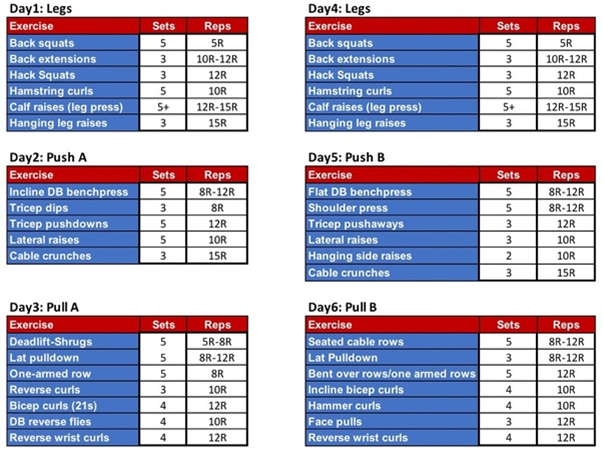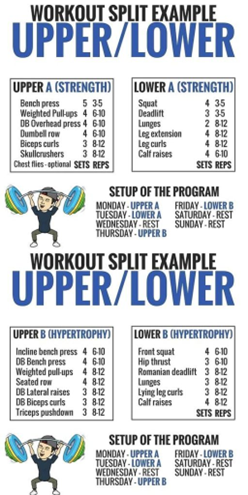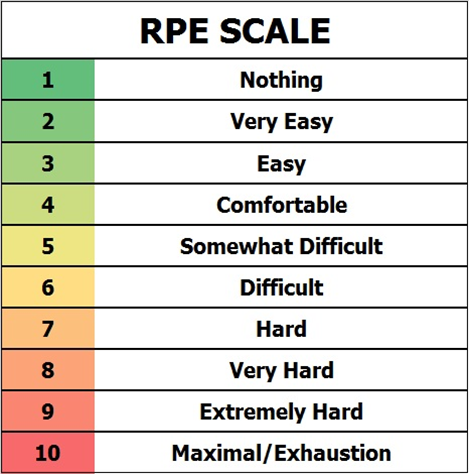In my previous blog i explained the first three principles to keep in mind before starting your workout journey. In this blog i will elucidate remaining 3 principles. If you haven’t read my previous blog, i would recommend you to check it out because all the six principles are interrelated.
FREQUENCY
Frequency simply means how frequently you train
your muscles.
the most notoriously famous training split in
fitness is bro split which means training each body part once a week. The
premise behind this split is to smash a muscle completely in one day and then
give it 5-6 days to recover from the fatigue/workload.
when i was new to fitness, i was also one of the
fan of bro split but when i started reading researches and all other stuff, i
came to knew that researchers have refuted the premise of bro split.
numerous researches have validated that if your
diet is on point, a muscle takes only 48-72 hours to recover completely from
the erstwhile workout. So, 48-72 hours roughly means 2-3 days.
It takes only 2-3 days for a muscle to recover
completely. So, in bro split by giving that muscle extra 2-3 days, you’re just
putting that muscle in an idle state.
Also if you’ll try to hit chest on just one day,
you won’t be able to perform every movement with you 100% because as the
session drags on, you will get more fatigued both mentally and physically.
A research was conducted in which scientist Schoenfeld
compared two 3 days per week training programs in well trained men with
different frequencies per muscle group. One was split where the lifter train
chest and back on day one, legs on day two and shoulder and arms on day three,
while the second group trained full body on everyday. The exercises, sets, reps
and loads were the same across the week in both groups, and interestingly
significantly greater increase in hypertrophy(increase in muscle size and
improvement in muscle composition) were observed in the group training full
body three days per week.
FREQUENCY RECOMMENDATIONS:
Try to spread the total volume in a way which allows you to
train your muscles 2-3 times a week.
The two most famous splits which allows you to
train your muscle 2-3 times are push pull leg split and upper lower
body split.
Intensity refers to how much you exert yourself in
the gym or how heavy or intense you’re lifting.
Method to measure your intensity:
1.
RPE scale
A popular way of measuring your intensity is
RPE(rate of perceived exertion) scale based on reps in reserve (RIR) scale.
RPE scale is based on how close to failure you get
at the conclusion of the set.
For instance, suppose you’re squatting 100kg and
after hitting 10 reps with 100kg, you’ve no energy left to hit an extra rep,
that means at 10th rep your RPE was 10(maximal) and your reps in reserve were
zero.
Now considering 10th rep as your failure point, you
decided to hit only 6 reps with 100kg. So, now your RPE will be 6 and RIR is 4.
INTENSITY RECOMMENDATIONS:
Don’t train to RPE 10 in compound exercises (bench
press, squat, deadlift etc. In compound exercises you must train close to RPE
7-8 and should always have 2-3 reps in reserve because in compound exercises,
various muscles are being targeted not only one muscle group. So, training to
absolute failure will mount up the chances of injuries.
Yes you can train to failure (RPE 9-10) in
isolation exercises because in these exercises, only one muscle is being
targeted and training to failure with proper technique won’t exhaust you
completely as in compound exercises.
You can check out the list of compound and
isolation exercise anywhere on internet, just google it.
REST PERIODS
I had already covered this topic in one of my IG
posts. I elucidated how much rest you need in compound and isolation exercises.
I also busted some myths related to rest periods. Go check it out.
So, that’s all about today’s blog. Hope you’ll like it, if you got any query, feel free to ask me on my Instagram DM or just mail me your query.
See you all in next blog. Till then, stay fit, keep exercising and be benevolent towards others.




Comments
Post a Comment